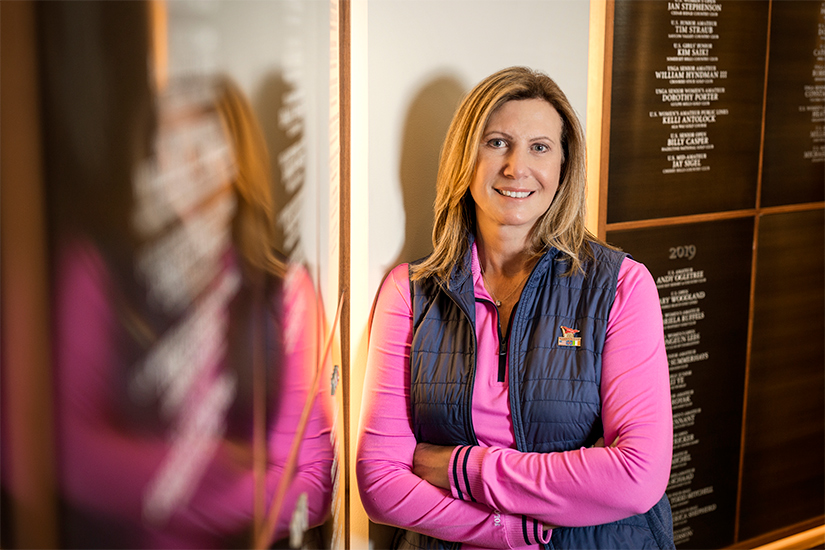|
Getting your Trinity Audio player ready... |
When Profile spoke to Susan Pikitch in late 2020, her year had already been turned entirely upside down. The COVID-19 pandemic had severely impacted many of the United States Golf Association’s (USGA) main revenue drivers for the year, with the organization having to postpone the US Open and the US Women’s Open and hold its championships without spectators. In addition, the USGA had to cancel ten of its fourteen national championships.
The CFO has helped shepherd the USGA through one of its most complicated and stressful periods which allowed the nonprofit to support and grow one of the few sports that was safe to play during the pandemic, continuing to inspire and engage players and fans, both young and old.
Pikitch spoke with Profile in late summer 2021 about the evolution of the CFO role, the USGA’s ability to pull together in a crisis, and how providing sound numbers just isn’t enough anymore.

Having grown from an audit perspective, what has led to your evolution in financial experiences throughout your career?
Early on, I was really focused on precision and accuracy and what amounted to spending a lot of time looking in the rearview mirror. One of the reasons I wanted to leave the audit function and take on more analytical roles was that I wanted to be a bit more forward-looking than reporting what happened in the past. I wanted to have the ability to positively influence the future.
Ultimately earning a role as the CFO of an organization, I’ve found that it’s more of an advisory position. There’s a huge importance around understanding the business and its core products and services, helping to shape strategy, and determining what the financial targets are.
When you’re assisting in whatever you’re doing—be it a budget, a forecast, a five-year plan, or strategy—you’re helping the individuals achieve [for example] that growth in revenue within the expected time frame and targets.
It’s not just about the numbers. It’s about achieving the objective in a way that you’re achieving the strategy while also having a financial mindset.
“Finance people are really great at identifying an issue. . . . But put yourself in the shoes of the people you’re trying to help.”
Susan Pikitch
How has the evolution of the CFO role played out in your own career?
Earlier in my career, I think the finance function was viewed more as command and control. It felt like I was the “CF-No” as opposed to the CFO, because people would always expect you to say no to everything. You are almost a parental factor there.
Now, I’d rather be thought of as the “CF-Go” and help figure out how to move the organization forward, as opposed to the “CF-No.” How do we enable the business to achieve its strategies, targets, and, in our case, our mission as a nonprofit organization? It’s even more important to not just keep our finances in order but also make sure that we’re deploying our funds and our investments in places that really have an impact outside of just what our internal targets are.
I’ve also seen my role evolve to be more of an advisor to the CEO and the executive leadership team. I try to act as an advisor and educator as opposed to a reporter. That’s just another filter I think about when I’m trying to provide input into a discussion.

What does it mean to be more than a “numbers reporter” for an organization?
Early in your career, you’re more focused about being precise and accurate and fulfilling your financial duties. But as you progress and grow through your career, those become table stakes. Everyone expects that to happen.
So how are you going to add more value than just providing a clear picture of where the numbers stand? It’s about helping the business understand why they should care by providing insights into the data. Make it easier for nonfinancial people to interpret the data. Don’t just say, “the revenue was x.” That’s table stakes. Explaining why it was x and recommending actions to improve revenue or highlight risk is where you can add more value.
Finance people are really great at identifying an issue. We need more revenue, or we have to spend less, or you missed your budget. But put yourself in the shoes of the people you’re trying to help. How do I help you achieve your goal? I know you’re trying to maximize revenue, but you can’t spend more than the revenue you’re bringing in. So how can I help you think through a way that will get you the results you want, but you’re also achieving the financial targets of the organization?
What are some of the challenges of adding value to a nonprofit like the USGA at such a difficult time?
The key words that come to mind are agility and flexibility. We had prepared a budget—but then March 2020 came and it became clear that that’s not what was going to happen. Being able to do on-the-fly scenario planning and work through all the new complications was critical.
We are traditionally a very well-oiled machine, but we had to rethink a lot of our approaches. How do we hold our championships safely and differently under this environment? Leadership had to be flexible, and finance had to provide support, and really roll up our sleeves and help figure out new solutions. I’ve never seen our leadership team pivot so hard and work so well together than I did during the pandemic.
“I’d rather be thought of as the ‘CF-Go’ and help figure out how to move the organization forward, as opposed to the ‘CF-No.’”
Susan Pikitch
Most of our revenue is event-driven, and we were only able to hold four of our twelve championships. We had financial reserves and insurance policies that we had the foresight to secure years ago, which could sustain us, but we also wanted to be able to continue to carry out our mission of championing and advancing golf through programs that grow the game and make it more accessible to everyone no matter their background.
We also didn’t want to let our championship entrants down. Qualifying to play in a USGA national championship is a difficult feat and can be life changing. We wanted to help keep people’s dreams alive during such a difficult time. With solid planning, we were able to fulfill these goals and keep our core stakeholders happy and afloat during an otherwise trying time.

